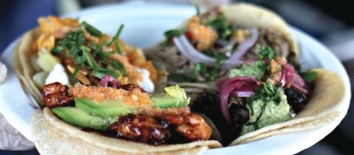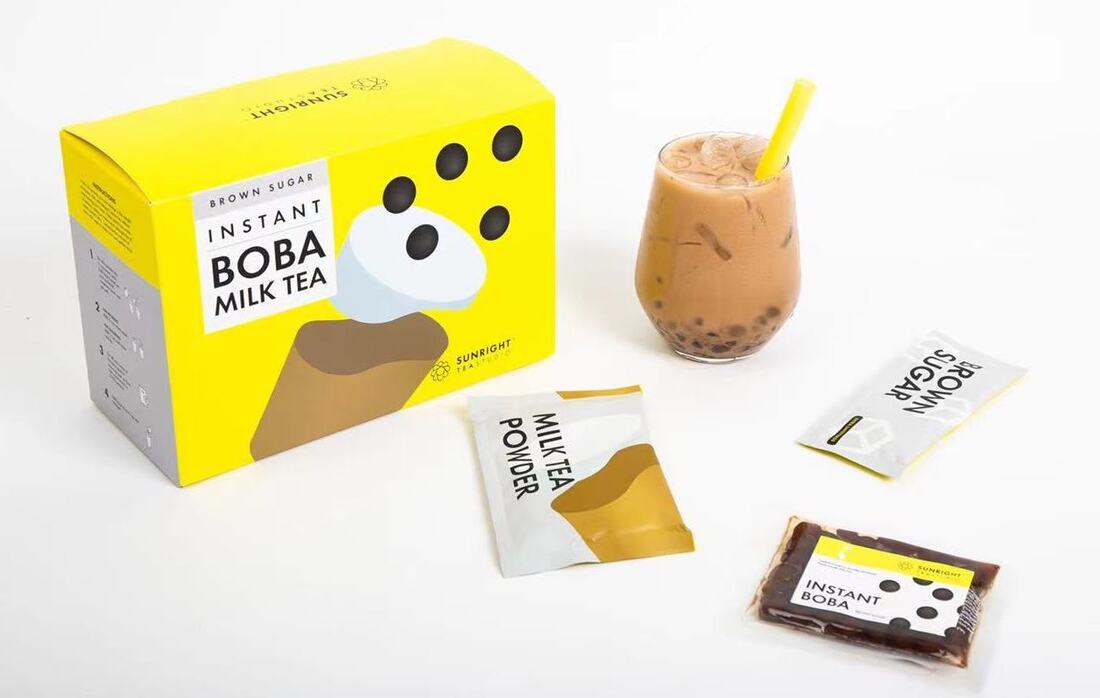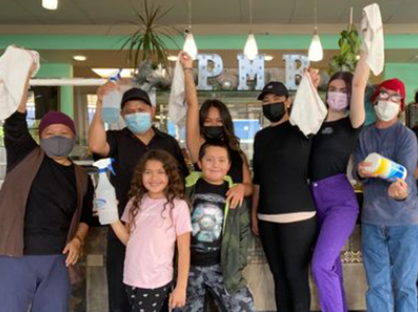|
Sunright Tea, one of SoCal’s hottest bubble tea shops, is now allowing patrons to bring the experience home with them. Their new do-it-yourself boba milk tea kits, requiring nothing more than ‘just add water,’ provide all the ingredients for a group to embark on a customized boba experience anywhere, anytime. Each brightly-colored kit includes six servings worth of milk tea powder, brown sugar, and chewy boba tapioca pearls, all individually packaged in single-sized portions, plus six wide boba straws. Preparation is simple: simply stir Sunright’s milk tea powder in a half a cup of warm water, then stir in brown sugar to taste. To customize further, based on whether you want a hot or cold boba drink, add a three-quarter cup of warm water or one cup of cold water over ice. To add the boba, cut off one corner of each instant boba pack to ensure proper air flow, then microwave for 25 to 30 seconds. From there, add in and indulge. Sunright Tea Studio prides themselves in sourcing quality ingredients and bringing great care each drink they serve. Their leaves are cultivated in mountaintop farms, where the plants soak in the essence of the sun and absorb the nourishment of the misty, evening rain. Farmers pick fresh leaves and carefully process them through rolling, roasting, and fermentation. The tea is then blended with other varietals based on origin, weather, and season, resulting in balanced and consistent flavor. And while their take-home milk tea boba kits should satisfy those seeking some off-premise indulgence, they’re also known for their stores’ fun ambiance that represents the free style of California. An extensive beverage menu features creations that integrate ceylon black tea, jasmine green tea, roasted oolong, and Four Seasons, a special oolong varietal. Each recipe is crafted for carefully-defined attributes of flavor and fragrance. Sunright Tea Studio has locations all throughout Southern California, and recently opened their first Northern California location in Sunnyvale. Guests can order from each location directly or visit Sunright Tea Studio online at SNRTea.com
8 Comments
The California Restaurant Foundation (CRF), in association with the California Restaurant Association, has awarded 318 restaurant owners and operators with grants of $3,500 as part of the Restaurants Care Resilience Fund. Grant recipients will also receive year-long support services including peer-to-peer mentorship and educational learning opportunities designed to equip them with the tools they need to lead their restaurant to long-term success. “We hope this is a way for the recipients to come out of the pandemic better than they were before it took place,” said Alycia Harshfield, Executive Director of the CRF. “We want to alleviate some of their payroll expenses and allow restaurants to bring back their staff. This allows them to make up for other expenses they’ve had to incur such as PPE and retrofitting parking lots for outdoor dining.” Of the 318 grant recipients, 65% are female restaurant owners and 83% identify as people of color. More than 130 grants were given in Los Angeles County, 77 in San Diego County, 62 in San Francisco and Alameda Counties, 29 in Sacramento and San Joaquin Counties and 18 in Fresno and Kern Counties. To qualify, the restaurants had to be single-unit, employ fewer than 50 staff members, be currently open and have experienced a revenue loss of at least 20% from 2019-2020. The grants also come with a year-long support program, where recipients join together virtually to engage in monthly educational learning opportunities, as well as share best practices to improve all aspects of their business. “We hope this is a way for the recipients to come out of the pandemic better than they were before it took place,” Harshfield said. “For example, this month we’re bringing in a legal expert to talk to them about what businesses need to know about reopening post-pandemic. We have others talking about menu engineering, marketing and legislative issues. We leave time at the end of each discussion for restaurants to talk to each other on the zoom meeting, and also spotlight one restaurant each month.” Harshfield led the CRF to launch the Restaurant Resilience Fund in March, partnering with SoCalGas, Pacific Gas and Electric Company (PG&E) and San Diego Gas and Electric (SDG&E), who collectively donated $1.25 million to fund the grants. Wells Fargo provided an additional $250,000 donation, bringing the program’s total to $1.5 million. Utility companies may not be the first source people would look to for securing restaurant grants, but Harshfield noted that symbiotic relationship between the two entities. Restaurants require utilities to operate and make up a large portion of their business, and the utility companies have aided in restaurant support programs long before the pandemic hit. “SoCal Gas has been supportive of our foundation’s High School Programs and our Restaurants Care Relief Fund over the years,” Harshfield said. “Their customers are restaurants and they have a first-hand view on what these customers have faced. They’ve provided programming of their own, such as rebates, and this was a natural evolution of what they were doing with us already.” The CRF’s impact on California restaurants spans far beyond pandemic-related grants. Founded in 1981, the organization’s mission is to invest in and support the future and current workforce of the foodservice industry. The CRF focuses on three pillars: high school culinary arts education, college and training scholarships, and financial safety nets for working professionals. “We see it as our opportunity to help train and recruit future industry leaders, to support those going to college, and to support hose currently in foodservice,” Harshfield said. “We’re here to serve those who serve, and seek to create a thriving restaurant community in California.” The Restaurants Care Resilience Fund was launched in 2017. Designed as a relief fund for F&B workers facing unforeseen crises, the program has provided financial support services for more than 1600 restaurant staff. The Restaurants Care Resilience Fund has helped restaurant workers through everything from illness and deaths in the family to wildfires, and now a global pandemic. “The pandemic has exposed vulnerabilities that we never really anticipated. People never would’ve guessed that the government could just close down your business,” Harshfield said. “And just as restaurants had to, we made a pivot during the pandemic to provide grants to people who were out of work.” A nonprofit vet going on her third decade in the noprofit world, Harshfield has been at the helm of the CRF for 11 years. Like many, she sees local, independent restaurants as the financial and cultural backbone of the communities they serve. The grants provided during the pandemic are of vital benefit, but her mission with the CRF focuses on the long term, not only sustaining businesses and their staff through tough times, but fueling them with new talent to grow the industry as a whole. “We have 13,500 ProStart students in our high school development program. A young lady who went though our program in Orange Country was able to go off to college, and has since moved back to open a restaurant,” she said. “It’s important that we encourage that drive for foodservice. We’re working with youth and providing life-ready skills for a job that allows them mobility and flexibility.”  The drought has swept through the media these past few months, grabbing the attention of avid news-watchers and politicians alike. Having mounted over the past several years, this weather problem is much more than a passing fad, and the restaurant industry is a prime victim of its effects. Amidst these circumstances, however, are significant opportunities for innovative restaurateurs to shine. ‘Water-friendly’ may be the newest iteration of ‘going green,’ and those who adapt their menus and operations to water conservation are primed to attract new customers and great publicity. A significant majority of our water supply goes to agriculture, with many sources claiming it as high as 80 – 90 percent! The media quickly latched onto this concept, and their attacks on foods that require more water for production [almonds are the poster child] have hurt sales. As a result, restaurants that rely on these under-fire ingredients may be perceived in a lesser light by the ‘foodie trendsetters.’ Taking the opposite approach, however—using more ingredients that require less water—may very well bring these trendsetters in through your doors and earn you a great word-of-mouth reputation. Using the drought to your benefit in this way requires small changes and big promotion: Making minor tweaks to your menu, using those tweaks to paint the best picture possible, then sharing that picture with everyone you can reach. Guerilla Tacos serves as a prime example. Located in Culver City [Los Angeles], this humble-yet-imaginative food truck made headlines with its ‘drought-friendly’ tacos. One of the key differentiators in this PR dream: sweet potato tortillas. While corn requires ~150 gallons of water per pound of corn produced, sweet potatoes require less than a third of that to yield the same amount. Combine that with the fact that sweet potatoes are a super food and you’ve hit two key food trends with one minor menu change…not to mention that people are definitely willing to venture out and try a sweet potato tortilla taco. As was the case for Guerilla tacos, these menu changes typically just require one ingredient swap. Here’s a few other simple drought-friendly ingredients that may work for your menu:
The list could go on for ages, but these items should get the creative juices flowing. Again, the key here is promotion. To best get the word out, try some of the following: 1. Test products as your daily specials As is the case with nearly every new product, a soft intro will help you make necessary adjustments to please the masses. Once you work out the smaller details [seasoning, portions, sides, etc.], the dish can become a permanent menu addition. 2. Highlight them on your menu Once a dish has been modified [or is just naturally drought-friendly], make that point known! Options include creating a dedicated ‘eco-friendly’ section, or an icon to mark items across the menu. 3. Train your service staff to promote these items Hosts and servers are your primary points of contact with the customer. Have your hostess mention drought-friendly changes while walking parties to their tables. Have your servers follow up by mentioning specific new menu items. 4. Promote through social media If you have a Facebook page, Twitter feed, Instagram account, blog, etc. then certainly keep your followers updated on any changes that elevate your brand. Don’t forget about operational modifications as well, such as water-friendly kitchen equipment and asking guests if they want water before serving [this is actually a law in some areas now]. And remember that ‘drought-friendly’ is subjective, so pursue these changes with the same caution as you would if advertising yourself as organic. Note: All food comparisons are based on water consumption only and do not include factors such as nutrition and taste profile. Ingredient discretion is, of course, left to the chef. |
AuthorBenjamin Brown is a seasoned restaurant writer and hospitality consultant, serving up SoCal's hottest food news and reviews. Categories
All
Archives
June 2021
@Foodie_Biz |
|
Home
About
Blog
Consulting Tips
Contact
Legal
|
Foodie Biz provides restaurant news and reviews for the food community, as well as consulting advice for restaurant owners and other hospitality professionals.
Contact Foodie Biz for media opportunities and freelance consulting projects. Contact Foodie Biz |





